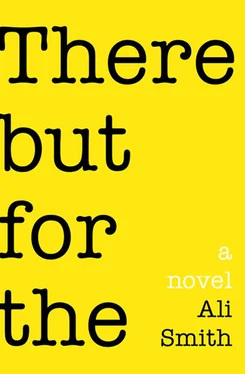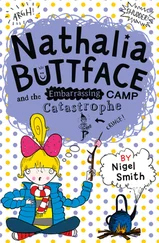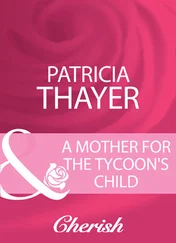Well, these are my days of grace. And you don’t get many of them.
Well, wish me luck as you wave me goodbye. No, not goodbye. Cheerio. The long cheerio. Not goodbye, May, Philip said when he was in here himself in this very pickle, and she’d been up doing the visiting and was about to get on her way home to pick up some things, pyjamas, clean things. Never goodbye, eh?
Philip was small against the pillows in the bed, and the man in the bed next to him couldn’t pass motions, whined away in a high pitch behind his curtain while he tried; he was in real bad pain it sounded like. There was a chap the other side of Philip so thin he looked like a skeleton already. Across the ward there was a man who looked perfectly well. He was the illest of them all with something happening in his brain. Philip rested against his pillows and raised his eyebrows at her like a comedian. Then he reached up his hand to his mouth and his eyes and his nose to make sure his face was decent for her. He never liked to affront. He was a clean man. An awful lot of women ended up unlucky in their men.
May Violet Young (née Winch) (F) (84) (widow, husband dec. 20.7.99) admitted to IC 6/09 with general collapse / delirium / high fever / UTI, passed for rehabilitation 7/09 to Wd 7 then 8/09 down to Wd 5 (Geriatric) (slated for closure in 2/10 as per new NHS guidelines whereby future chronic-convalescence elderly: reallocation to community / family care). Post 7 months UTI MRSA cycle: advisory meeting with NOK allocated “palliative care only” (though Mrs. Young was not aware this decision had been made for her, by her son Patrick Young, by her daughter Eleanor Bland, contact details for both on file, and by the sharp-nosed jumped-up peremptory little fellow who was the doctor, five foot five at the most, that was all, but whose mere appearance on the ward could make the nurses, the male ones too, scuttle about like a hutch of frighted chickens you could hear all the way down the ward.
Not that he scared May Young, she could see right through the likes of him, funny little chap who, in the very way he slammed his hand against the little plastic thing on the door with the stuff in it which gave out the antiseptic, made May Young want to say, at his disappearing back, in her most calm voice, foul words the like of which she had never said in her life, never even thought in her life, hadn’t even known till then that she even knew existed).
Which was all proof, which all went to show, that May Violet Young (May Winch as was, till she married Philip that June day in ’47, the river outside the church they got married in bright the length of itself with sunlight, and even the ruins themselves you could call the word beautiful then, with the grass growing and all the wild flowers nobody’d expected putting their pretty heads up all over the city) was not dead yet. She could prove for sure she was not dead yet because there, sweaty in the old claw of an old hand, whose old hand? her old hand, her own, go on, open it, proof: the balled-up tissue which held what she’d managed to get out of her mouth of the stuff they gave her to make her forget to remember the day, the month, the prime minister, make her drop her bowl with the custard in it, stuff which she had not swallowed, would not swallow, which she’d held under her tongue when the nurse, Irish-Liverpool, always a cheery word, gave her, and if it wasn’t Irish-Liverpool it was Derek the male nurse, lovely boy from the Caribbean, with May nodding and sending them on their way with a friendly eye.
May was also not dead yet because she had seen the future, and their future would not, while she had life in her, be her future.
Not Harbour House.
Well, she’d rather die, was the long and the short of it.
For in Harbour House (and even the very name was a lie, not even the ghost of a harbour anywhere near the place) she had, some years ago, visited a poor old lady. The poor old lady had been Mrs. Masters, and she was what you’d call a real lady, well-to-do, a long-time loyal client of Reading Flooring and Carpeting right from when Philip opened the business in ’52. Philip had sold to her and through her to her friends too, for decades, the woven wool and rayon and nylon lines, the latex backing lines, linoleum lines, variegated yarn, the Danish, the short twist pile, deep pile, the cut pile lines, right up to the time of the hardwood and laminate. Thanks to Mrs. Masters, Philip had floored the quality’s houses for years. Quality always brought quality with it. And Mrs. Masters was a fine clever lady, had been in Intelligence in the war.
May had sat in the Lounge of Harbour House with Mrs. Masters. She knew it was the Lounge because there was a sign, the kind you buy in Woolworths, stuck on the wall. It was cheap gold plastic and it said the word Lounge.
She had held Mrs. Masters’s hand and had looked down as Mrs. Masters dozed, at the old lady’s feet in their clean slippers on the carpeting of Harbour House.
The carpeting was an affront to those slippers. The carpeting was inadequate. It was patchy. It was none-too-clean.
In May’s other hand she had a brochure she’d picked up at the front door. The brochure said that prospective Residents of Harbour House were positively encouraged to bring one or two small mementoes with them when they came, and that the occasional (small) item of furniture was also permitted on request.
Someone, just then, had put a hand on May’s arm. May had looked up. A woman, not very old, maybe in her late forties and wearing a nice scarf, cashmere, asked her in quite a frank way if she wouldn’t mind settling up.
May explained she was just visiting for the afternoon. She wasn’t family or anything.
We accept Mastercard and Visa, the well-dressed woman said.
I think you’ll find there’s been some misunderstanding, May said.
Then the well-dressed woman took May by the arm quite firmly and led her through to Reception, pointing out where the décor had been done up and where it still needed to be done up and telling May how much the wallpapering had cost. At the front desk she took May’s hand cordially, said goodbye, and then as she swept off up the stairs Harbour House’s teenage receptionist had leaned over the desk, had made a face, had lightly touched her own forehead and had let May know that the well-dressed woman was an inmate (her exact word) who believed the place to be a guesthouse she’d run in her old life.
Ever afterwards May had berated herself for not having had the nerve to shout up the stairs after the well-dressed woman that she should sack that insolent receptionist first chance she got.
The longer-term outcome of it, though, was this. May would know she was dead for definite when she no longer remembered to think to herself: I would rather die and go to hell than wake up one day and find myself an inmate in that guesthouse of gone minds, gone things, bad carpets, furniture that needs permission.
For the well-dressed woman had been right about some things. There were things that did have to be settled up in a life. Mastercard, Visa, if only.
There was the rabbit. No amount of Mastercard or Visa would settle the rabbit May’d shot, got first time too, with Philip’s old air rifle.
It was a wild rabbit that had taken to coming to visit the back garden. It wasn’t even as if that rabbit was doing any harm. It sat and nibbled prettily among the flowers.
One day May had seen it there again and, without taking her eye off it, had stood in the kitchen and slipped off her shoes. She had backed away from the window and gone as quietly as she could through the first door, then the next door and into the garage. She’d persuaded the top off the rusty tin where Philip had kept the pellets. She’d cleaned the dust off the gun barrel with her apron and picked a fiddly pellet up and thumbed it into the little hole in the broken-open gun, then again with another, and she’d shut the gun and gone back through the house on quiet stockinged feet to the open kitchen window.
Читать дальше












